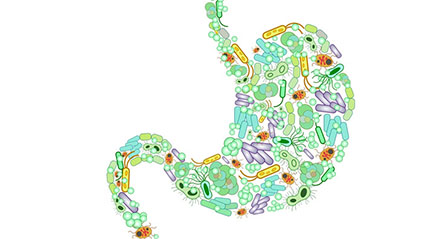Do you know your microbiotas?

© biotechnocentre.fr
In a global scientific research context considered exponential, experts from the University Hospitals of Geneva (HUG) and the University of Geneva (UNIGE) are forging fruitful collaborations. Here is a selection of the current studies.
THe Stomach
The intestinal microbiota --where the concentration of bacteria is the highest-- is involved in many processes, going beyond the intestinal sphere alone. Its role in digestive and metabolic health, and therefore in weight gain and obesity, is of great interest.
Studies have shown that obesity can be transmitted from one mouse to another by transplanting its microbiota. But is it obesity that modifies the microbiota or the other way around? Probably both. With regard to diabetes, studies in humans suggest that insulin resistance may be due to intestinal bacteria. "The next step would be to act on obesity or diabetes by modifying the microbiota in order to reduce caloric absorption, improve insulin sensitivity or reduce blood sugar," say Mirko Trajkovski, professor of metabolism and physiology at UNIGE Faculty of Medicine, and Ozren Stojanovic, post-doctoral fellow at UNIGE.
Their research consists in finding the composition of the microbiota that is most beneficial for metabolic health, with a focus on fats: "Exposure to cold induces changes in the composition of the microbiota, resulting in a better fat metabolism, since the white fat (energy storage in the form of triglycerides) is transformed into brown or beige fat (the one that burns calories and turns them into heat)", says Professor Trajkovski. But which bacteria specifically contribute to the modification of the profile of these fats? That's what they're trying to find out....
Fatty liver and alcoholic liver, same affliction
Diseases of fatty liver and alcoholic liver, whose mechanisms are similar, influence the composition of the intestinal flora, as explained by Dr Nicolas Goossens, head of clinic at the Department of Gastroenterology and Hepatology of the HUG: "In fatty liver disease, intestinal bacteria produce alcohol, which causes similar damage to this organ to that of individuals suffering from alcoholic liver disease. Better characterizing the microbiota of these patients and establishing correlations with their clinical parameters are the objectives of a future study: "We want to make finer and more predictive diagnoses for people at risk in order to improve their treatment," says the specialist.
The cachexia
On another side, Professor Laurence Genton Graf, Associate Assistant Physician in the Endocrinology, Diabetology, Hypertension and Nutrition Department of the HUG, and her team are working to better understand the role of the microbiota in malnutrition and the loss of mass muscle (cachexia) associated with it. This loss leads to a decrease in physical functions and an increase in the risk of infection. Their intervention study analyses the effects on the microbiota of nutritional components known to increase mass muscle. The goal being to identify the bacteria associated with a better mass muscle.
Undernutrition or obesity, the idea is to better understand the impact of food on the microbiota. Its modulation could open many therapeutic perspectives. In the long term, "we hope to better feed and treat the individual according to his or her own characteristics," concludes Professor Genton Graf.
[...]
THE BRAIN
Recent animal studies have shown the possible influence of the microbiota on behaviour, opening up new original perspectives. Mice raised in sterile conditions were less sociable than their counterparts in the control group. Also, it has been shown that the transfer of microbiota between anxious and adventurous mice has changed their behaviour, the latter becoming more fearful, and vice versa. These results have stimulated the research, which attempts to explore the relationships between intestinal bacteria and psychological (anxiety, depression), neurodevelopmental (autism) or neurological (Alzheimer and Parkinson) diseases.
Several hypotheses are emerging, among them: "Intestinal bacteria, by acting directly on the mucous membrane and digestive wall, could produce serotonin, a neurotransmitter involved in mood regulation," explains Stephan Eliez, professor in the Department of Psychiatry at the Faculty of Medicine of UNIGE.
Another explanation is that "bacteria could push immune cells to produce cytokines, molecules that can influence neurophysiology and brain functions".
Other theories include the production of metabolites in the intestine, substances carried by the blood that could reach the brain and change our behaviour.
Author : Élodie Lavigne, Pulsations, HUG Magazine >
Translation : Tania Secalin, with the help of DeepL
